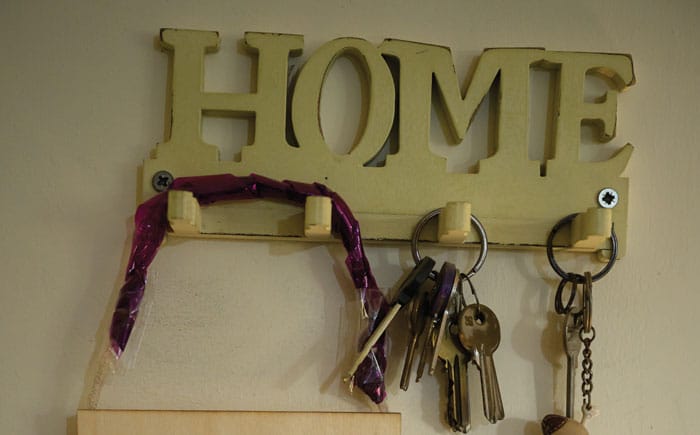 A sign reading “Home” is seen in a house invaded during the attack by Hamas, within Kibbutz Be’eri on October 14, 2023 in Be’eri, Israel. Leon Neal/Getty Images
A sign reading “Home” is seen in a house invaded during the attack by Hamas, within Kibbutz Be’eri on October 14, 2023 in Be’eri, Israel. Leon Neal/Getty Images The streets are one house of mourning, grocery shopping
is a shiva call
when our neighbors look up, their eyes
reflect our sorrow
too much sky and too much sunlight
white tarp ripped off flimsy beams, palm fronds
myrtle branches in the curb
The walls I beheld each day with serendipity
rose-colored, desert-beige
purple and yellow flowers, shy couples blushing
at dusk, Uriel’s smile
the fragrance of warm stones and jasmine, the stray cat
with turquoise eyes —
I wanted to pretend that what I loved was near, intact
alive
Farmers and dancers, men chanting
at dawn on Shabbat morning
henna shrubs, the full moon
over the Sea of Salt, hopeful orchards along Road 90 —
Along California state route 138
where olive trees no longer bloom
my feet in dusty sandals
I bought local peaches, and a watermelon
and for a helpless moment
l could not forget
our desecrated sukkas
our scorched sanctuaries, our mothers raped and spat on
our trampled borders, our murdered babies
See this land that I assigned —
I want to know where they will live
if they will live
in 50 years
the future orphans, widows, wailing fathers
all those conceived with love this winter
This poem is inspired by the Israeli song “Children of Winter.”
Julia Knobloch is a rabbinical student at HUC-JIR in Los Angeles and the author of two volumes of poetry: Book of Failed Salvation (2021) and Do Not Return (2019).






















 More news and opinions than at a Shabbat dinner, right in your inbox.
More news and opinions than at a Shabbat dinner, right in your inbox.